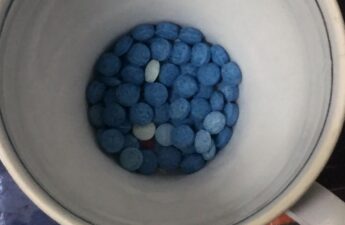
By Jackie Fortier, StateImpact Oklahoma
All eyes will be on Oklahoma this week when the first case in a flood of litigation against opioid drug manufacturers begins Tuesday.
Oklahoma Attorney General Mike Hunter’s suit alleges Johnson & Johnson, the nation’s largest drugmaker, helped ignite a public health crisis that has killed thousands of state residents.
With just two days to go before the trial, one of the remaining defendants, Teva Pharmaceutical Industries of Jerusalem, announced an $85 million settlement with the state on Sunday. The money will be used for litigation costs and an undisclosed amount will be allocated “to abate the opioid crisis in Oklahoma,” according to a press release from Hunter’s office.
In its own statement, Teva said the settlement does not establish any wrongdoing on the part of the company, adding Teva “has not contributed to the abuse of opioids in Oklahoma in any way.”
That leaves Johnson & Johnson as the sole defendant.
Court filings accuse the company of overstating the benefits of opioids and understating their risks in marketing campaigns that duped doctors into prescribing the drugs for ailments not approved by regulators.
The bench trial — with a judge and no jury — is poised to be the first of its kind to play out in court.
[khn_slabs slabs=”790331″ view=”inline”]
Nora Freeman Engstrom, a professor at Stanford Law school, said lawyers in the other cases and the general public are eager to see what proof Hunter’s office offers the court.
“We’ll all be seeing what evidence is available, what evidence isn’t available and just how convincing that evidence is,” she said.
Most states and more than 1,600 local and tribal governments are suing drugmakers and distributors. They are trying to recoup billions of dollars spent on addressing the fallout tied to opioid addiction.
Initially, Hunter’s lawsuit included Purdue Pharma, the maker of OxyContin. In March, Purdue Pharma settled with the state for $270 million. Soon after, Hunter dropped all but one of the civil claims, including fraud, against the remaining defendants. Teva settled for $85 million in May, leaving Johnson & Johnson as the only opioid manufacturer willing to go to trial with the state.
But he still thinks the case is strong.
“We have looked at literally millions of documents, taken hundreds of depositions, and we are even more convinced that these companies are the proximate cause for the epidemic in our state and in our country,” Hunter said.
Precedent-Setting Case
The companies involved have a broad concern about what their liability might be, said University of Kentucky law professor Richard Ausness.
“This case will set a precedent,” he said. “If Oklahoma loses, of course they’ll appeal if they lose, but the defendants may have to reconsider their strategy.”
With hundreds of similar cases pending — especially a mammoth case pending in Ohio — Oklahoma’s strategy will be closely watched.
“And of course lurking in the background is the multi-state litigation in Cleveland, where there will ultimately be a settlement in all likelihood, but the size of the settlement and the terms of the settlement may be influenced by Oklahoma,” Ausness said.
‘There’s Nothing Wrong with Producing Opioids”
The legal case is complicated. Unlike tobacco, where states won a landmark settlement, Ausness pointed out that opioids serve a medical purpose.
“There’s nothing wrong with producing opioids. It’s regulated and approved by the Federal Drug Administration, the sale is overseen by the Drug Enforcement Administration, so there’s a great deal of regulation in the production and distribution and sale of opioid products,” Ausness said. “They are useful products, so this is not a situation where the product is defective in some way.”
It’s an argument that has found some traction in court. Recently, a North Dakota judge dismissed all of that state’s claims against Purdue, a big court win for the company. In a written ruling that the state says it will appeal, Judge James Hill questioned the idea of blaming a company that makes a legal product for opioid-related deaths. “Purdue cannot control how doctors prescribe its products and it certainly cannot control how individual patients use and respond to its products,” the judge wrote, “regardless of any warning or instruction Purdue may give.”
Now the Oklahoma case rests entirely on a claim of public nuisance, which refers to actions that harm members of the public, including injury to public health.
“It’s sexy you know, ‘public nuisance’ makes it sound like the defendants are really bad,” Ausness said.
If the state’s claim prevails, Big Pharma could be forced to spend billions of dollars in Oklahoma helping ease the epidemic. “It doesn’t diminish the amount of damages we believe we’ll be able to justify to the judge,” Hunter said, estimating a final payout could run into the “billions of dollars.”
Hunter’s decision to go it alone and not join with a larger consolidated case could mean a quicker resolution for the state, Ausness said.
“Particularly when we’re talking about [attorneys general], who are politicians, who want to be able to tell the people, ‘Gee this is what I’ve done for you.’ They are not interested in waiting two or three years [for a settlement], they want it now,” he said. “Of course, the risk of that is you may lose.”
Looking For Treatment
Oklahoma has the second-highest uninsured rate in the nation and little money for public health. The state is trying to win money from the drug companies to pay for treatment for people like Greg, who is afraid he’ll lose his job if we use his last name.
Greg and his wife, Judy, said they haven’t been able to find the integrated treatment that Greg needs for both his opioid addiction and his bipolar disorder. It’s either one or the other.
“They don’t give you … a treatment plan for both,” Judy said. “They just say ‘Here, you can talk to this person.’ They don’t recognize that it’s like self-medicating.”
The couple live in Guthrie, Okla., about an hour north of the courthouse where the opioid trial will take place. Greg said he has been addicted to opioids for 11 years. People with prescriptions sell him their pills — sometimes Greg binges and takes 400 milligrams of morphine at once, a huge dose.
Of the $270 million Purdue settlement, $200 million is earmarked for an addiction research and treatment center in Tulsa, though no details have been released. An undisclosed amount of the $85 million Teva settlement will also go to abating the crisis. Judy said she hopes the treatment center will eventually help Greg.
“I wish he would stop using [opioids], but I love him. I’ll always be here,” she said.
This story is part of a partnership that includes StateImpact Oklahoma, NPR and Kaiser Health News.

